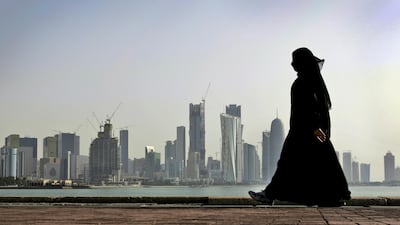Bahrain says it will start imposing entry visas on Qatari nationals and residents from November 10 as a "security" measure, stepping up pressure on Doha days after calling for the GCC to freeze its membership.
Citizens from the six GCC countries are supposed to be able to travel within the Gulf visa-free using only an identity card.
Manama, along with the UAE and Saudi Arabia, announced a travel ban on Qatari citizens on June 5. But the latest move appears to formalise travel restrictions for Qataris.
"The new measures [are aimed] at preventing harming the security and stability of the kingdom of Bahrain particularly in light of the latest repercussions of the crisis with Qatar," Bahrain's official BNA news agency said on Tuesday.
The travel ban on Qataris announced by Bahrain, the UAE and Saudi Arabia on June 5 came as the three countries and Egypt severed diplomatic and trade links with Doha over its support of extremist groups and links with Iran.
On Monday, Bahrain's foreign minister, Sheikh Khalid bin Ahmed Al Khalifa, called for the GCC to freeze Qatar's membership "until it sees reason and accepts the demands of our countries".
The latest move by Manama comes as Iran looks to Tehran to improve trade links, including establishing a transport corridor to Azerbaijan and Turkmenistan via Iran.
_________________
Read more:
Qatar falls further under Iran's spell with new trade routes
Tillerson warns of 'those looking to exploit Qatar crisis' to destabilise the region
Gargash slams Qatar for attempting to 'undermine' UAE's role in Yemen
________________
Qatari transport minister Jassem bin Saif Al Sulaiti met with his Iranian counterpart, Abbas Akhundi, on Monday during a visit to Iran to help flesh out a deal to increase trade and transport ties.
"Iran and Qatar are trying to take advantage of trade, port and transit co-operation through [an] Iran-Qatar corridor," Mr Akhundi said. This corridor would link up Iran with Turkmenistan and Azerbaijan via the Imam Khomeini Port on Iran's southern coast.
The two ministers also agreed to form a joint committee for transport and communications to better facilitate trade and serve both countries' commercial interests.
Qatar has relied more heavily on Iran since the Arab quartet launched its boycott, with Tehran and Turkey becoming the two major suppliers of Qatar's food imports.
Unable to import goods across its only land border, which is with Saudi Arabia, Qatar has been forced to use air or sea routes at up to ten times the cost.
On the sidelines of Monday's meeting, Shiran Asal, the largest food company in Iran, with sales of about US$5 billion (Dh18.4bn) a year, said it planned to set up a factory in Qatar to meet demand there for Iranian products.
The company, which produces more than 1,000 products, said it had been studying the market in Qatar for the past four months and received encouraging feedback.
"The people in Qatar are ready to buy products produced in Iran, and fortunately there is a demand for Iranian products," Hussein Mahfouzi, Shiran Asal's Middle East chief executive officer, told The Peninsula, an English-language newspaper based in Doha.
"Our future plan is to have a factory for the Qatar market as soon as we count the quality of products that have more demand in the Qatari market."
Also on Tuesday, GCC secretary general Dr Abdullatif bin Rashid Al Zayani condemned what he termed as "irresponsible media attacks" carried out by some Qatari news outlets toward the GCC.
The Bahraini official described Qatari media coverage as an unjust campaign that has gone beyond all customs, values and media professionalism.
Mr Al Zayani also expressed his surprise at attempts by some Qatari media organs to hold him, in his capacity as GCC secretary general, responsible for resolving the crisis with Qatar.
“Officials in the Qatari government and the Qatari media are fully aware that the solution of the crisis and the end of its repercussions are in the hands of the GCC leaders,” he added.
Mr Al Zayani called on the Qatari media to stop hindering any attempts at reconciling the crisis, saying the anti-GCC campaign was attempting to undermine attempts by Kuwaiti Emir Sheikh Sabah Al Ahmad Al Sabah to mediate the crisis.

